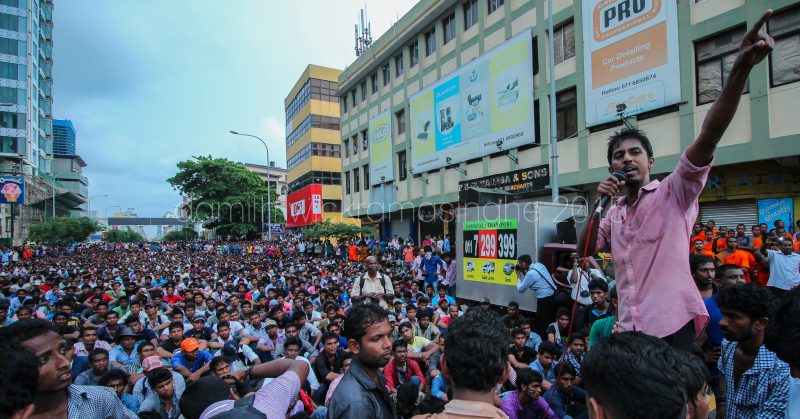
A student protest in Sri Lanka. PHOTO: Damith Wickramasinghe (CC BY 2.0)
In selecting locations for Global Voices’ biennial Summits we take into consideration a number of criteria, including the host nation’s record on human rights and freedom of expression. Many people will have heard about Sri Lanka’s civil war, which ended in 2009, but some may not be familiar with what has taken place in the country since that time. In the following essay, Groundviews [1]’ Raisa Wickremantunge [2] fills us in on recent developments in Sri Lankan politics.
Sri Lanka is an interesting place to be holding the Global Voices Summit, especially towards the end of 2017.
Attendees will have the opportunity to interact with government officials responsible for media and freedom of expression, in addition to civil society leaders, youth from across the country, leading social media voices, writers, journalists and activists. The agenda will also embrace public events where a broader segment of society can interact with the core ideas and key resource persons at the Summit.
Sri Lanka itself is in a constant state of flux. The space for activism and advocacy is growing increasingly contested, but there is still room for engagement with the State. This has led to some positive outcomes, such as the deferral [3] of a proposed bill on hate speech after sustained lobbying from civil society [4], the Human Rights Commission [5] and political parties in the Opposition [6]. The Right to Information Act, when it was passed, also contained several amendments [7] made following suggestions from civil society.
On January 8, 2015, Sri Lankans voted in President Maithripala Sirisena, a coalition candidate from the Opposition, whose campaign centred around promises of good governance, transparency and a crackdown on corruption [8]. Sirisena’s election put an end to ten years of a severe, debilitating democratic deficit that saw the country hit the bottom of every single major press freedom ranking year after year, as well as experience one of the highest number of enforced disappearances in the world and an extremely violent end to nearly thirty years of a violent secessionist war.
The subsequent year saw improvements in the areas of political rights and civil liberties [9].
The Right to Information Act, passed in 2015, was approved [9] by the parliament in June 2016, and the first requests were filed earlier this year. In August 2016, parliament approved legislation that established an Office of Missing Persons, tasked with setting up a database of missing persons, advocating for them and their families, and recommending redress. There has been some progress [10] on investigations into high profile murder cases committed under the previous regime, including of journalists and editors. IFJ estimates that 32 journalists and media workers [11] have been killed in Sri Lanka between 1990 and 2015.
More people are starting to campaign and protest issues that matter to them, from citizens demanding land rights [12] to protests by families of the disappeared [13], demanding answers – protests which would in the past have been suppressed by the police or military [14]. Compared to the pre-2015 period, there are also increased attempts to consult with civil society on topics ranging from media regulations [15], Right to Information legislation [16], constitutional reform [17] to transitional justice [18].
And yet, there is still a long way to go. The invariably messy politics of a coalition government notwithstanding, these promising initial steps have seen little in the way of coherent policymaking, concrete implementation and sustained progress. In an update on the human rights situation in 40 countries on September 11, UN High Commissioner Zeid Ra'ad Al Hussein flagged the slow progress [19] Sri Lanka has made on transitional justice, for instance. The government has made several contradictory statements [20] in this regard purporting to accountability, particularly in relation to the judicial mechanism.
Many protesters in Sri Lanka, while not met with violent pushback as in the past, are nevertheless subjected to threats and intimidation [21]. There is need for security sector reform, particularly within the police service, with reports of torture continuing even after the change of government, as flagged by both the UN Special Rapporteur on Human Rights and Counterterrorism, Ben Emmerson [22] after an official visit to Sri Lanka, and the National Human Rights Commission [23] in a report to the Committee Against Torture .
Sri Lanka has a small window of opportunity to make progress on the promises it has made, and has made initial steps in this direction, from passing legislation to hold Provincial Council elections [24] to the Office of Missing Persons finally becoming operational on September 15 [25] (though there have been serious concerns raised [26] as to this process).
The Financial Crimes Investigative Division also recently closed its first case [27] convicting the former President’s Secretary and the former Director General of the Telecommunications Regulatory Commission of misuse of state funds [28], and a Presidential Commission of Inquiry [29] is also surfacing embedded corruption, although the process to accepting accountability is slow [30].
As Sri Lanka prepares for its next Presidential Election in 2020, it will hopefully benefit from the engagement, discussion and independent perspectives provided by dedicated, passionate individuals at this year’s Summit. The interactions here may prove vital for the challenges that Sri Lanka faces, as it grapples with implementing a new electoral system, processes of transitional justice and building a new constitution, in 2018 and beyond.